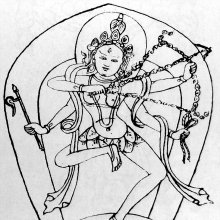Rite, Ṛte: 10 definitions
Introduction:
Rite means something in Hinduism, Sanskrit, biology. If you want to know the exact meaning, history, etymology or English translation of this term then check out the descriptions on this page. Add your comment or reference to a book if you want to contribute to this summary article.
Rite has 8 English definitions available.
The Sanskrit term Ṛte can be transliterated into English as Rte or Rite, using the IAST transliteration scheme (?).
Images (photo gallery)
(+9 more images available)
Languages of India and abroad
Sanskrit dictionary
[Deutsch Wörterbuch]
Source: Cologne Digital Sanskrit Dictionaries: Böhtlingk and Roth Grosses Petersburger WörterbuchṚte (ऋते):—gaṇa svarādi zu [Pāṇini’s acht Bücher 1, 1, 37] (ṛte). praep. mit Ausschluss von, ausser, ohne [Amarakoṣa 3, 5, 3.] [Hemacandra’s Abhidhānacintāmaṇi 1527.]
1) mit vorang. oder folg. abl. [Pāṇini’s acht Bücher 2, 3, 29.] [Vopadeva’s Grammatik 5, 21.] na ṛ.e tvatkriyate.kiṃ ca.a [Ṛgveda 10, 112, 9. 86, 12. 1, 18, 7. 7, 11, 1.] ṛ.e sa vindate yu.haḥ [8, 27, 7.] yasmā.indrādbṛha.aḥ kiṃ ca.emṛ.e [2, 16, 2. 12, 9. 8, 1, 12.] ya ṛ.e ci.gāspa.ebhyaḥ [2, 39. 9, 69, 6.] [Vājasaneyisaṃhitā 17, 14. 34, 3.] [Atharvavedasaṃhitā 4, 26, 6.] no hyṛte goryajñastāyate [The Śatapathabrāhmaṇa 2, 2, 4, 13. 3, 7, 3, 1. 10, 5, 3, 8. 13, 3, 8, 6.] [Śāṅkhāyana’s Śrautasūtrāṇi 12, 6, 13.] [Bṛhadāranyakopaniṣad 5, 12. 6, 1, 8.] [Chāndogyopaniṣad 5, 1, 8. fgg.] [Aitareyopaniṣad 3, 11.] [Manu’s Gesetzbuch 2, 172. 5, 68. 9, 263.] [Yājñavalkya’s Gesetzbuch 2, 89.] tābhya ṛte nvayaḥ wenn diese nicht da sind, (erbt) die Familie [117.] abhrātṛko haretsarvaṃ duhitṝṇāṃ sutādṛte wenn kein Sohn von Töchtern da ist [134.] na tvanyamabhigaccheyaṃ pumāṃsaṃ rāghavādṛte [Mahābhārata 3, 16144.] [Rāmāyaṇa 2, 12, 46. 30, 7. 42. 3, 13, 23. 36, 24. 4, 10, 7. 5, 37, 31. 6, 10, 22. 25.] [Pañcatantra V, 30.] [Śākuntala 32, 12. 60, 4. 150.] [Raghuvaṃśa 3, 63.] [Kumārasaṃbhava 2, 57.] [Hemacandra’s Abhidhānacintāmaṇi 1527,] [Scholiast] —
2) mit vorang. oder folg. acc. [Vopadeva’s Grammatik 5, 7.] [Prātiśākhya zum Ṛgveda 1, 15.] pāṇḍavāḥ kimakurvaṃste tamṛte [Mahābhārata 3, 3090. 3096. 4001.] anyaḥ -ṛte devaṃ pinākinam [1591.] [Bhagavadgītā 11, 32.] [Sundopasundopākhyāna 1, 22. 3, 30.] [Nalopākhyāna 4, 26. 12, 65. 98. 24, 11. 25. 33.] [Rāmāyaṇa 1, 27, 15.] [Viśvāmitra’s Kampf 7, 20.] [SĀṂKHYAK. 41.] —
3) am Anf. eines comp.: ṛterakṣas adj. wobei die Rakṣas ausgeschlossen sind: ṛterakṣā vai yajñaḥ [Aitareyabrāhmaṇa 2, 7.] — Ist der Form nach ein loc. von ṛta und kann wohl auch begrifflich damit in Verbindung gebracht werden: in der gehörigen Ordnung, im wahren Verhältniss bis zu d. i. von hier an nicht mehr in der gewöhnlichen Ordnung.
--- OR ---
Ṛte (ऋते):—
1) ṛte yataḥ ausgenommen dass [Mahābhārata 14, 2582.]
Source: Cologne Digital Sanskrit Dictionaries: Sanskrit-Wörterbuch in kürzerer FassungṚte (ऋते):—Loc. Praep. mit Ausschluss von , ausser , ohne , wenn nicht — da ist ; mit vorangehendem oder folgendem Abl. oder Acc. Mit folgendem yatas ausgenommen dass.
Sanskrit, also spelled संस्कृतम् (saṃskṛtam), is an ancient language of India commonly seen as the grandmother of the Indo-European language family (even English!). Closely allied with Prakrit and Pali, Sanskrit is more exhaustive in both grammar and terms and has the most extensive collection of literature in the world, greatly surpassing its sister-languages Greek and Latin.
See also (Relevant definitions)
Starts with: Ritebarhishka, Ritebhanga, Riteja, Ritekarmam, Ritemula, Ritena, Riterakshas, Riteshu, Ritesphya, Riteyajnam, Riteyu.
Ends with (+58): Abhyudirite, Akkarite, Alamkrite, Amalinacarite, Amamtrite, Amrite, Amtarite, Anavadyacarite, Anupamacarita, Apahrite, Asamskrite, Ashrite, Asthiracarite, Atmacarite, Avrite, Badhirita, Bahishkrite, Bathing ritual, Bhujamgabhogashrite, Cape marguerite.
Full-text (+4113): Samskara, Karmakanda, Antyeshti, Kriya, Antyakarman, Uttarakriya, Riterakshas, Luptapindodakakriya, Samskriya, Nimittadharma, Pitrikarman, Purashcarana, Niyamanishtha, Karmanga, Karma, Diksa, Siddhasadhana, Parimara, Yajnakratu, Nityakarman.
Relevant text
Search found 305 books and stories containing Rite, Ritē, Ṛte, Rte; (plurals include: Rites, Ritēs, Ṛtes, Rtes). You can also click to the full overview containing English textual excerpts. Below are direct links for the most relevant articles:
Manusmriti with the Commentary of Medhatithi (by Ganganatha Jha)
Verse 11.45 < [Section IV - Expiation: General Laws (prāyaścitta)]
Verse 5.67 < [Section IX - Other forms of Impurity]
Verse 3.67 < [Section VII - Duties of the Householder]
Blue Annals (deb-ther sngon-po) (by George N. Roerich)
Chapter 12 - Teurapa (rte'u ra pa'i skabs) < [Book 14 - Great Compassion Cycle]
Chapter 10 - Phagmodru Lineage (x): bsod grags pa < [Book 8 - The famous Dakpo Kagyü (traditions)]
Chapter 29 - Sonam Gyatso (viii): Paranirvāṇa < [Book 10 - The Kālacakra]
Rig Veda (translation and commentary) (by H. H. Wilson)
Garga Samhita (English) (by Danavir Goswami)
Verse 5.13.32 < [Chapter 13 - The Arrival of Sri Uddhava]
Verse 6.21.21 < [Chapter 21 - In the Description of the Third Fort, the Glories of Piṇḍāraka-tīrtha]
Verse 4.1.20 < [Chapter 1 - The Story of the Personified Vedas]
Mimamsa interpretation of Vedic Injunctions (Vidhi) (by Shreebas Debnath)
Chapter 6 - Prayogavidhi (Introduction)
Chapter 4.5 - Criteria of a Difference of Rite
The Linga Purana (by J. L. Shastri)
Chapter 52 - Rites for enslaving, fascinating etc. < [Section 2 - Pūrvabhāga]
Chapter 25 - The holy rites of fire pertaining to Śiva < [Section 2 - Pūrvabhāga]
Chapter 29 - The mode of the charitable gift of Hiraṇyagarbha < [Section 2 - Pūrvabhāga]
Related products









